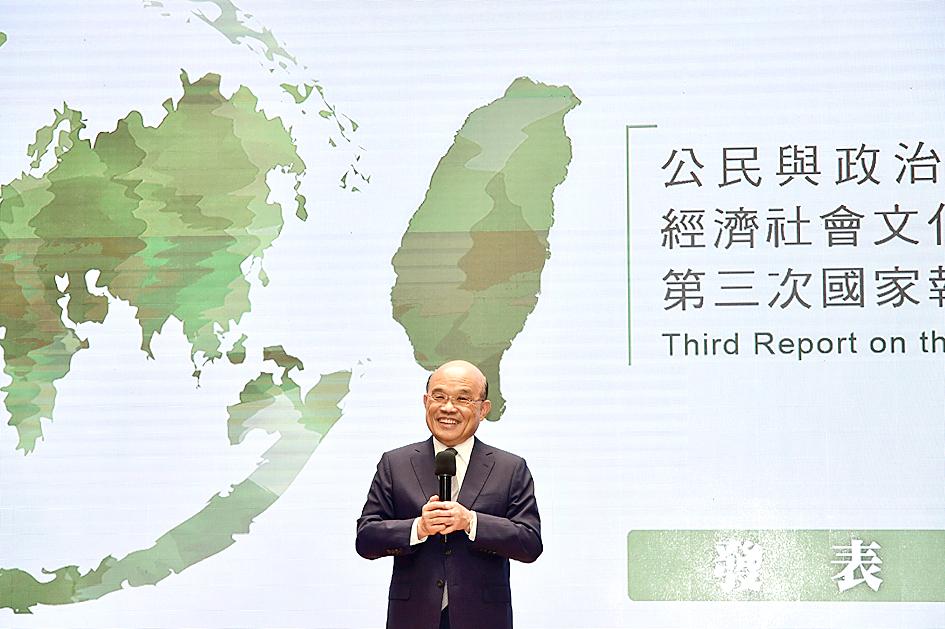The Executive Yuan yesterday published Taiwan’s third national report on the implementation of two international human rights covenants, touting milestones set over the past four years, including the decriminalization of adultery and legalization of same-sex marriage.
The UN International Covenant on Civil and Political Rights and the International Covenant on Economic, Social and Cultural Rights state that member states should submit a national report on the implementation of each covenant every four years.
Taiwan ratified the two covenants in 2009 and then passed legislation to make them part of domestic law.

Photo: George Tsorng, Taipei Times
The latest report documents human rights efforts made by the government, Premier Su Tseng-chang (蘇貞昌) said.
For example, it has been one year since same-sex marriage was legalized, and although many expressed concerns over the legalization one year ago, polls show that more than half of Taiwanese now support equal marriage rights, Su said.
The government has also established national human rights parks, he said, in an apparent reference to the Jing-Mei White Terror Memorial Park (白色恐怖景美紀念園區) in New Taipei City and the Green Island White Terror Memorial Park (白色恐怖綠島紀念園區), which commemorate Martial Law era victims.
Yesterday was the first time the report was published under the name of the Executive Yuan. Previously the reports were submitted by the Presidential Office’s Human Rights Consultative Committee, which stopped operating on May 19, after the Organic Act of the Control Yuan National Human Rights Commission (監察院國家人權委員會組織法) took effect on May 1.
To promote “the right to adequate standard of housing,” the Ministry of the Interior has completed national housing projects and their budgeting, as well as promoted the registration of the actual selling prices of real estate, so that house buyers can view transparent details of the transactions, Executive Yuan Human Rights Protection and Promotion Committee convener Lo Ping-cheng (羅秉成) said.
The Labor Standards Act (勞動基準法) has been expanded to include resident doctors in its protection, while the Labor Dispute Act (勞動事件法), which took effect in January, safeguards the rights of parties in labor-management litigations, he said.
Fishers have enhanced protection now under the Regulations on the Authorization and Management of Overseas Employment of Foreign Crew Members (境外僱用非我國籍船員許可及管理辦法), he said.
The government plans to make several other international human rights pacts part of domestic law, and it is to introduce more action plans on Human Rights Day on Dec. 10, he added.
Additional reporting by CNA

CHAOS: Iranians took to the streets playing celebratory music after reports of Khamenei’s death on Saturday, while mourners also gathered in Tehran yesterday Iranian Supreme Leader Ayatollah Ali Khamenei was killed in a major attack on Iran launched by Israel and the US, throwing the future of the Islamic republic into doubt and raising the risk of regional instability. Iranian state television and the state-run IRNA news agency announced the 86-year-old’s death early yesterday. US President Donald Trump said it gave Iranians their “greatest chance” to “take back” their country. The announcements came after a joint US and Israeli aerial bombardment that targeted Iranian military and governmental sites. Trump said the “heavy and pinpoint bombing” would continue through the week or as long

TRUST: The KMT said it respected the US’ timing and considerations, and hoped it would continue to honor its commitments to helping Taiwan bolster its defenses and deterrence US President Donald Trump is delaying a multibillion-dollar arms sale to Taiwan to ensure his visit to Beijing is successful, a New York Times report said. The weapons sales package has stalled in the US Department of State, the report said, citing US officials it did not identify. The White House has told agencies not to push forward ahead of Trump’s meeting with Chinese President Xi Jinping (習近平), it said. The two last month held a phone call to discuss trade and geopolitical flashpoints ahead of the summit. Xi raised the Taiwan issue and urged the US to handle arms sales to

State-run CPC Corp, Taiwan (CPC, 台灣中油) yesterday said that it had confirmed on Saturday night with its liquefied natural gas (LNG) and crude oil suppliers that shipments are proceeding as scheduled and that domestic supplies remain unaffected. The CPC yesterday announced the gasoline and diesel prices will rise by NT$0.2 and NT$0.4 per liter, respectively, starting Monday, citing Middle East tensions and blizzards in the eastern United States. CPC also iterated it has been reducing the proportion of crude oil imports from the Middle East and diversifying its supply sources in the past few years in response to geopolitical risks, expanding

Pro-democracy media tycoon Jimmy Lai’s (黎智英) fraud conviction and prison sentence were yesterday overturned by a Hong Kong court, in a surprise legal decision that comes soon after Lai was jailed for 20 years on a separate national security charge. Judges Jeremy Poon (潘兆初), Anthea Pang (彭寶琴) and Derek Pang (彭偉昌) said in the judgement that they allowed the appeal from Lai, and another defendant in the case, to proceed, as a lower court judge had “erred.” “The Court of Appeal gave them leave to appeal against their conviction, allowed their appeals, quashed the convictions and set aside the sentences,” the judges